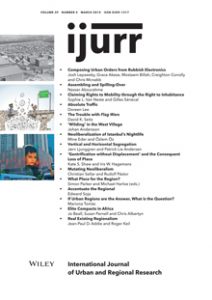Through reflection on the practical post-apartheid (re)alignment of competing rationalities across the Greater Durban urban region, this essay teases out the interface between traditional and modern settlement management systems, and explores how governance cleavages are being renegotiated and mediated. It is suggested that, in building an integrated method of operating across the fragmented city-regional scale and navigating the competing interests involved, the practice of African urbanism is being defined. Without making any claims for what may or may not be uniquely African city-regional dynamics at the boundaries of tradition and modernity, what is clear from the Durban case is that both conventional city-regional literature and new city-regional ideas have glossed over the complexity of finding solutions to tensions between poor communities, urban managers, elected local authorities and the traditional rural elites of the functional city-regions of Africa.
Interventions
Details
Written by:
Jo Beall, Susan Parnell and Chris Albertyn
Digital Object Identifier (DOI)
10.1111/1468-2427.12178
About DOI
Read full article as PDF
Read full article as HTML
See the references for this article

